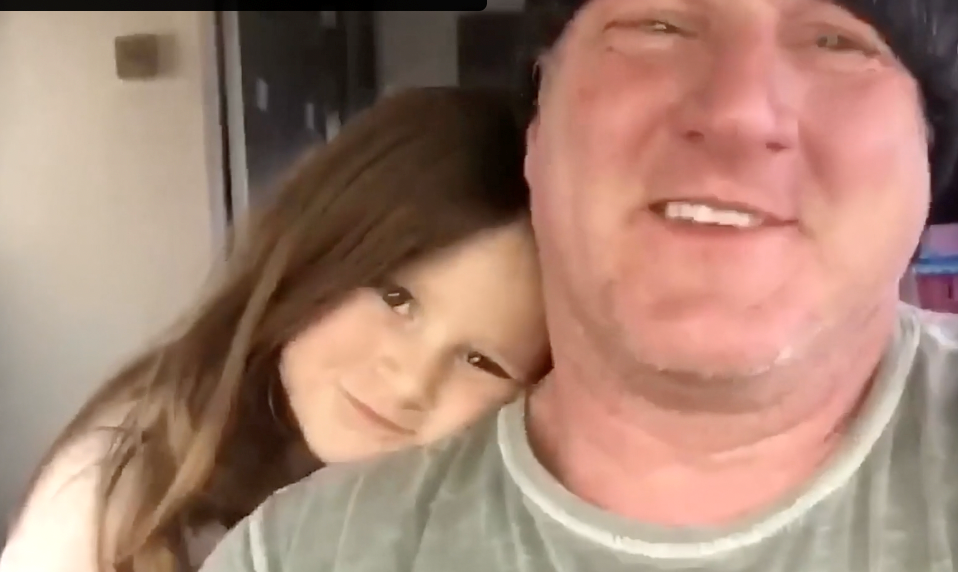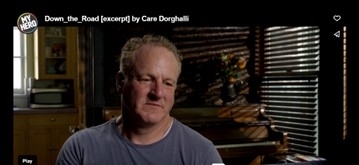What would you do if you saw a wildfire destroy 95% of a town? How would you help the survivors whose homes burned to the ground? For James ‘Woody’ Faircloth in Denver, the answer seemed simple: provide them with an RV. And upon witnessing the 2018 Camp Fire in Paradise, California, he and his six-year-old daughter Luna did just that. Without hesitation, they drove across the country to donate an RV to a family who lost everything to the inferno. But when they arrived, the two quickly realized they couldn't stop there.
The film ‘Down the Road’, directed by Care Dorghalli from the USC School of CInematic Arts is narrated by Luna. Care uses a cinematic and poetic visual style to follow the journey of Woody and Luna as they provide transitional homes to survivors of some of California’s deadliest fires. With evocative personal accounts from three people who received RVs, along with endearing home videos of Woody and Luna’s road trip adventures, we witness the ripple effect of a father and daughter’s unyielding altruism and discover an alarming truth: the work is only just getting started.
The Camp Fire erupted in Northern California in November 2018 and rapidly became one of the deadliest and most destructive wildfires in the state's history. The fire, fueled by strong winds and dry conditions, left a trail of devastation in its wake, destroying over 18,000 structures and claiming 85 lives. The tight-knit community of Paradise was especially hard-hit, as the entire town was virtually reduced to ashes.
‘Down the Road’ (excerpt) has won three awards at the 19th MY HERO International Film Festival: 2023 Relationships First Award, The Humanitarioan Award and Care, herself, is being honored as MY HERO's 2023 Emerging Artists Award.
Said the judges: " Your film reflects a very powerful relationship between Woody and Luna, as well as with all of the people whom they help along the way. We also want to recognize YOU with the 2023 Emerging Artist Award! Our team feels that you show great promise as a filmmaker and deserve recognition for that."
The excerpt begins with Woody reminiscing how he and his daughter were following the news about the devastation of the Camp Fire and how they were particularly moved by the coverage of a man fleeing in an RV who, despite losing his house, was grateful to have the van to call home for Thanksgiving. Without any previous ties to Paradise, that story hit home and motivated Woody to want to do something meaningful to help. And so Woody and Luna’s journey to make a difference began.
 Woody and LunaCare Dorghalli
Woody and LunaCare Dorghalli
In the excerpt, Woody reports that even though he had never been in a motor home before, he turned to Luna and asked, “Why don’t we get an RV and drive it out there and give it to a family that lost their home? What do you think about that?”
Luna replied: “Aw, Dad, God and Santa Claus are gonna be proud of us.”
Faircloth tells us that the original plan was to take a $2,500 motor home he found on Craigslist and hand it over to a family, but when they got there, the devastation had a huge impact. He said to his daughter, “These people need help and she replied, “Let’s do it.”
Recognizing that many Camp Fire survivors were left without homes and basic amenities, Woody devised a plan to provide not just immediate shelter but also a sense of stability to these families by fundraising to donate and deliver many RVs to the victims.
The logistics of the operation were no small feat. They had to secure RVs, organize transportation and coordinate with local authorities and affected families. But their determination and the generosity of their supporters made it all possible.
 WoodyCare Dorghalli |
WoodyCare Dorghalli |
As social media posts about the original trip spread, donors started offering Faircloth their RVs. Some offered to deliver the vehicles themselves, but Faircloth chose to take many of the RVs himself. Woody and Luna also launched a crowdfunding campaign to finance their mission and the response from individuals and businesses across the country was overwhelming. Donations poured in, allowing them to purchase several RVs to deliver to Paradise.
Over the ensuing years, Faircloth has traversed thousands of miles, often with Luna at his side, delivering over a hundred RVs to victims of wildfires. Faircloth tries to schedule the trips on weekends but often uses vacation from his full-time job at the telecom company Comcas while also juggling his non-profit: EmergencyRV.org.
In 2021, EmergencyRV.org sent five vehicles from San Diego to Maui on a ship in 2021. Faircloth has since been recognized as a CNN hero for his efforts.
To watch the excerpt go to: myhero.com/down-the-road-excerpt
MY HERO interviewed Care about the process of making the film:
Could you please tell us about yourself in relation to your film?
I woke to find a looming cloud billowing over a ridge on Nov. 8, 2018. Its orange and purple hues were unlike anything I had ever seen before. After further investigation, I realized it wasn’t a cloud. It was smoke. The Camp Fire, the deadliest and most destructive wildfire in California history, had just begun its rage. My family was forced to evacuate. We were eventually able to return home, but not all were. 18,000 structures were destroyed. 85 lives were lost. The town of Paradise, California was never the same.
At the time, I was a journalist at my hometown newspaper. I desperately wanted to provide my community with a glimmer of good news. I found a father and 6-year-old daughter who drove across state lines to donate an RV to a family that lost its home to the inferno. Their names are Woody and Luna.
My stories about their random act of kindness went viral, prompting people nationwide to do the same. Woody and Luna were so inspired that they founded a nonprofit devoted to housing survivors of natural disasters nationwide. I’ve been following their progress since. Today, they have donated over 120 RVs to survivors of wildfires, hurricanes, tornadoes and floods. Their work seems to have no end. That’s because climate change continues to wreak havoc.
Merely two years after the Camp Fire, my community was ravaged once more. I was jolted awake by thunder and looked out the window to see smoke rising again. This time, it was in my front yard. A dry thunderstorm rolled through the area. Lightning rained down, sparking dozens of fires. The one by my house was quickly extinguished, but not all were.
The remaining fires converged to create the Bear Fire. The town of Berry Creek, California was devastated. Woody and Luna returned to deliver more RVs to volunteer firefighters who lost their homes while saving lives. Nearly all was lost, including my immigrant father’s business, Village Market. My family was suddenly in the story I was covering. These wildfires have affected me on a personal level.
When it came time to choose a topic for my thesis documentary, I couldn’t stop thinking about the Camp Fire and Bear Fire. I pitched a film about Woody and Luna and was immediately greenlit by my professors. Luna narrates this film because she’s the reason the story exists. Woody would not be doing this work were it not for his daughter. She’s his ultimate inspiration. She keeps him going. I’ve seen this family change lives before my eyes.
This documentary explores a loving relationship between a father and daughter and the ripple effect it continues to have nationwide. I made this film to raise awareness of the havoc wrought in my community and to provide audiences with an opportunity to help by supporting Woody and Luna’s work. I believe documentary filmmaking is a powerful avenue toward change. Woody and Luna have hundreds of people on their waitlist: people desperate for shelter. I’m eager to see where this film goes and the implications it will have at home.
How long have you been making films?
I’ve been into video production since I was an undergrad at California State University, Chico. But I never considered myself a filmmaker until I began my master’s program at the University of Southern California. I’m on the verge of graduating with a master of fine arts in film and television production. Down the Road was my thesis film.
What other issues are most important to you and why?
The climate crisis is extremely important to me, as well as matters of immigration. I’m a first-generation daughter of immigrants. I have many family members who are refugees all over the world.
Who else was on the team? Who produced the film?
This film was made through a Class at the University of Southern California. I had an incredible team of classmates:
Producers: Mariam Abd-Allah Kate Hanson
Director of Photography: Jonathan E. McCormack
Editors: Jiarong “Chrissie” Lu Sche-Hao “Thomas” Wang
Production & Sound Designers: Karolina Esqueda Rocha John Say
What was it like for you to make this film? What were some of the challenges, successes, and high points?
This film was incredibly difficult to make because of how personal it was. It was an extremely emotional process. I knew I had to do right by the story and characters. I needed to make something that could lead to social change. That was the goal. Thankfully, I feel like I accomplished that.
Do you have a mentor or a personal hero?
My personal heroes are my parents. They immigrated to this country with the dream of creating a better life for their children. They succeeded. I’m so proud of them.
What's next for you?
I’m currently producing a thesis film about the exploitation of child migrant workers.
How important is it you you to have won awards at the 19th MY HERO International Film Festival?
It’s important to me that my film is an official selection for an award with the My Hero 19th International Film Festival because it just affirms that the characters of my film are real-life heroes. They can’t be seen as anything less. It truly is a wonder what they’ve been able to accomplish. So many lives have been changed by the kindness and goodness of their hearts. It makes me emotional to think about.
The MY HERO International Film Festival
The MY HERO International Film Festival is an annual event dedicated to showcasing films of up to 10 minutes in length that celebrate the power of the human spirit. Categories include documentary, narrative, music video, experimental, and animation. There are Special Awards, with cash prizes, for films with themes of Peace, Activism, Women Transforming Media, Relationships, Immersive Storytelling, Youth Reporters, and Sing for Hope Music Videos.
Philanthropist and mentor Eva Haller is hosting the Virtual Awards Ceremony for The 19th Annual MY HERO International Film Festival on November 18, 2023, at 2 PM PST, as part of her weekly salon series. You can register your interest HERE.
Page created on 10/10/2023 7:15:55 PM
Last edited 11/7/2023 10:29:05 AM
